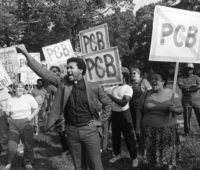Drawing upon a long history of anti-racist, feminist, and decolonial struggles, Malini Ranganathan continues our “Just Environments” series with an essay that suggests freedom can serve as a powerful analytic through which to reimagine environmental justice. Ranganathan makes the case that a comprehensive understanding of freedom must include (though, crucially, is not limited to) the ability to live in a safe and clean environment. Situating environmental harms within a broader emancipatory politics, she brings us closer to redressing multiple, intersectional injustices.













